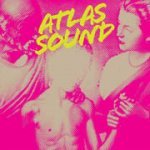
Atlas Sound Let the Blind Lead Those Who Can See But Cannot Feel
(Kranky)
The dissipation of alternative acclaim for Deerhunter’s debut album Cryptograms last year perhaps set up Bradford Cox’s solo venture up for a kind of modest anticipation of sorts, the kind that is either met with instant appraisal, or decisive contrariness. So, it is maybe appropriate to approach his debut, Let the Blind Lead Those Who Can See But Cannot Feel, with a blank mind: a posteriori. Besides, Let the Blind seems to inhabit a completely different sphere to that of any of Deerhunter’s releases to date - all at once intimate yet spacious, succinct yet complex, less accessible, reserved yet sometimes intrusive.
Sonically, Cox’s sound is made up largely from his own voice, sometimes layered and melted into blissful ambience, at other moments whispering eerily in your ears. Listening to the record on holiday in Japan having no prior knowledge of the songs, Let the Blind seemed to me to merge perfectly with the surroundings. Without delving too deeply and (more) pretentiously into my own personal relationship with the record, it is a good indication of the depth of these songs and their ability to attach themselves emotionally to experience. Cox translates his own concerns from thought to pure sound, and it is rewarding to spend time with the deep textures, melodies, emotions of each track. A wiser man than I once wrote, of similar a musical expression, regarding a specific phrase: "It was the charms of an intimate sadness that it sought to imitate, to recreate, and their very essence, for all that consists in being incommunicable and in appearing trivial to everyone save him who experiences them, had been captured and made visible by the little phrase." Whether we share Cox’s concerns or not is irrelevant, in this case, his phrases are open to interpretation, even identification with his larger themes.
The record deals with a very personal state of being with which Cox has had to deal with throughout his lifetime – that of being in institutions and the catastrophic effects as a consequence of spending time in them, perhaps best exemplified on Quarantined, which needs no further explanation of its subject matter. Relationships, internal and exterior damage, dreams and waking life all feature, but often enough the lyrics matter less than the effect his hypnotic mantras have on the ears.
Where other self produced records tend to communicate their authenticity through the recording process itself, Cox achieves this feeling using the sheer weight of his composition, his vocal pronunciation and his confessional lyricisms. It is difficult to induce all this in one sitting; however with increased listening it is possible to gain emotional accretion, and increased enjoyment as a result. On River Card, the lyrics in any other place might sound saccharine; however, there is not a hint of erroneousness when Cox sings, paired with an astounding backing track: “River so clear and blue, I'm so in love with you, but you drown me.”
Let the Blind is an album of depth, an album to spend time with. Like many great records, there is a lot to take in, inviting you to return to enjoy its depth. Bradford Cox has created a work that musically and lyrically will attach itself to your consciousness, reflecting exterior experience and encouraging inner association with the former.
27 April, 2008 - 16:45 — Neil Insh